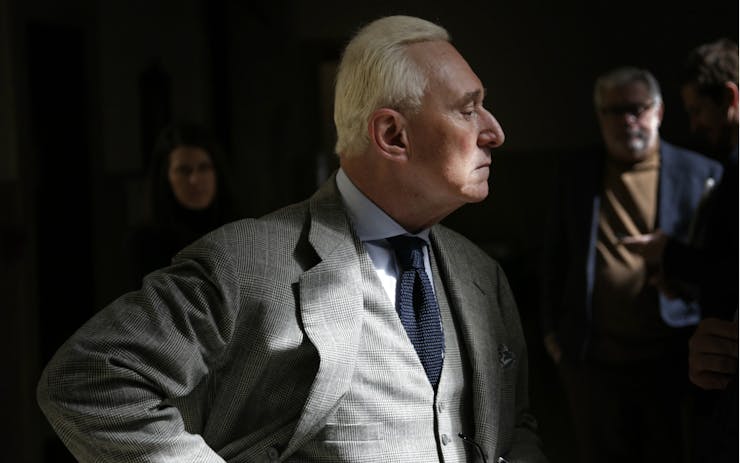The cannabis legalization movement gained two unlikely allies over the weekend: Republican political consultant Roger Stone and Dallas Cowboys Owner Jerry Jones.
Stone, a lobbyist, political consultant, and Breitbart contributor who helped mastermind President Donald Trump’s courtship of the right, posted a scathing report on his website Stone Cold Truth making a case for why Trump and his administration should leave cannabis legislation up to the states.
“I urge President Trump to honor his word and keep his promise,” he wrote, noting Trump’s past statements in support of medical cannabis and irrespective of what his Cabinet members may say.
Jones, meanwhile—who last season called it “not a good look,” for rookie running back Ezekiel Elliot to pay a curious visit to a cannabis shop in Seattle—said at last week’s annual NFL owners’ meeting that it’s time for the league reconsider its ban on cannabis.
‘Liberty Minded Americans’
In his post, Stone argues that tens of millions of “liberty minded Americans” believed Trump’s commitment to medical cannabis and states’ rights given statements he made before taking office.
“For medicinal purposes, for medical purposes,” Trump said in November 2015, “absolutely, it’s fine.”
“While Jeff Sessions is an excellent jurist and an astute politician, he unfortunately is also an adherent to outmoded thinking on marijuana.”
A month earlier, Trump had told the Washington Post: “In terms of marijuana and legalization, I think that should be a state issue, state-by-state.”
Following Trump’s election, cannabis legalization advocates clung to those comments as an indication the new administration would leave state cannabis markets alone.
Then came Trump’s nomination of Attorney General Jeff Sessions, who famously said that “good people don’t smoke marijuana.” (A statement Stone calls “plainly false.)
Shop highly rated dispensaries near you
Showing you dispensaries nearStone describes Sessions as “far from the mainstream” on cannabis:
While Jeff Sessions is an excellent jurist and an astute politician, he unfortunately is also an adherent to outmoded thinking on marijuana. As a product of the Religious South, it is natural that AG Sessions would take the dimmest view of marijuana, but there is little room left for debate as to the origin of the marijuana prohibition laws and how they were formulated as a tool to bludgeon both the poor and minorities, the largest consumers of the formerly legal plant.
He notes that the plant’s “medicinal value is proven yet strangely still denied by the Federal Government” and even quotes the Bible and Thomas Jefferson in defense of federal reform.
In the end, Stone urges Trump “to honor his word and keep his promise, irrespective of what his Cabinet members may say. There are so many other ways that law enforcement can be put to good use rather than to persecute harmless farmers and shopkeepers who are abiding by State law.”
NFL’s Jerry Jones Flip-Flops
Just months after criticizing star rookie Ezekiel Elliot for checking out a state-legal cannabis store before a preseason game in Seattle, the NFL’s most notoriously outspoken team owner reportedly wants the league to relax its rules on cannabis.
According to Mike Florio, of Pro Football Talk, Jones, speaking to fellow owners, said he wants the league to drop its prohibition on cannabis use.
The Cowboys owner, Florio reports, was, “reminded that the issue falls under the umbrella of collective bargaining, which would require the players to make one or more concessions in exchange for significant changes to the marijuana prohibition. “
Cannabis, under the current bargaining agreement, is a banned substance under the league’s substance abuse policy. Any change to that rule would have to be incorporated into the next collective bargaining agreement—or the NFL Players Union would have to make concessions, as Jones was reportedly told.
As a sports fanatic who’s spent time in athletic PR, I’m still not sure how to read the news from Jones. After all, three key players—Rolando McClain, Demarcus Lawrence, and Randy Gregory—all faced suspensions last season for violating the league’s substance abuse policy. Gregory has been dogged by failed cannabis tests dating back to his college days at the University of Nebraska.
Is Jones’ change of heart sincere? Does he truly recognize the potential of cannabis in a league that passes out painkillers like candy? Or is it simply a change he thinks would help him field the best team? For now, that remains to be seen.
But if the owners and players want to explore the option, now’s the time to begin. As SB Nationreports, the current collective bargaining agreement was established in August 2011 and is set to expire in 2020.






